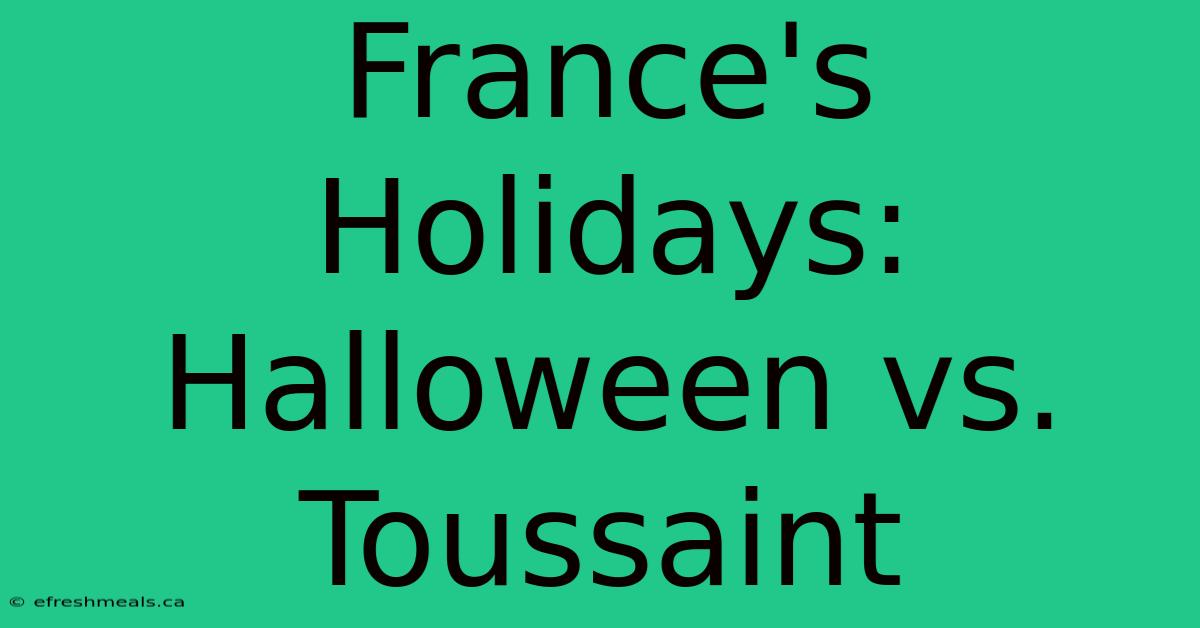France's Holidays: Halloween Vs. Toussaint

Discover more detailed and exciting information on our website. Click the link below to start your adventure: Visit Best Website nimila.me. Don't miss out!
Table of Contents
France's Holidays: Halloween vs. Toussaint - Which One Holds More Meaning?
Editor's Note: Halloween and Toussaint are celebrated in France, but which one holds more significance for the French? This article explores the differences and cultural importance of these two holidays.
Why It Matters
Halloween, a primarily American celebration, has become increasingly popular in France over the years. However, Toussaint, a traditional French holiday, remains deeply rooted in the nation's history and culture. Understanding the nuances of these two holidays helps us appreciate the evolution of French celebrations and the interplay between global trends and local traditions.
Key Takeaways of Halloween and Toussaint
| Feature | Halloween | Toussaint |
|---|---|---|
| Origin | Celtic festival of Samhain | Christian holiday honoring the dead |
| Date | October 31st | November 1st |
| Activities | Trick-or-treating, costume parties, spooky decorations | Visiting cemeteries, remembering loved ones, lighting candles |
| Symbolism | Ghosts, witches, monsters, the supernatural | Remembrance, family, faith |
| Popularity | Growing, especially among children | Traditional, still deeply observed |
Halloween in France
Introduction
While Halloween originated in Celtic cultures, it's now a globally celebrated holiday, particularly for children. In France, Halloween has been gaining traction in recent decades, primarily due to its commercial appeal and American cultural influence.
Key Aspects
- Commercialization: Halloween's commercialization has contributed to its widespread adoption in France. Supermarkets stock up on costumes, candy, and decorations, creating a festive atmosphere.
- Children's Celebrations: The focus of Halloween in France remains largely on children, with schools often hosting themed parties and allowing trick-or-treating.
- American Influence: The rise of Halloween in France is largely attributed to American cultural influence, particularly through movies, TV shows, and media.
Discussion
While Halloween is becoming more prevalent, it's essential to acknowledge that it's not deeply embedded in French culture. Its influence primarily revolves around its commercial appeal and children's activities.
Toussaint in France
Introduction
Toussaint, also known as All Saints' Day, is a deeply rooted French holiday that holds significant cultural and religious meaning. It's a time for reflection, remembrance, and honoring loved ones who have passed away.
Key Aspects
- Religious Significance: Toussaint is a Catholic holiday commemorating all saints. Churches hold special masses, and families often attend services in honor of their deceased loved ones.
- Family Tradition: Toussaint is a time for families to visit cemeteries, decorate graves with flowers, and light candles in memory of their departed relatives.
- Day of Remembrance: This day is dedicated to remembering and honoring the lives of deceased loved ones, promoting a sense of family history and connection.
Discussion
Toussaint's religious and cultural significance in France is profound. It transcends Halloween's commercial appeal and focuses on a more personal and heartfelt connection to loved ones who have passed away.
The Relationship between Halloween and Toussaint
While Halloween and Toussaint share a proximity in timing, their themes and cultural significance differ greatly. While Halloween focuses on the supernatural and commercialization, Toussaint emphasizes remembrance, family, and religious faith. These contrasting perspectives highlight the diverse cultural influences that shape France's holiday traditions.
FAQ
Q: Is Halloween celebrated more than Toussaint in France? A: While Halloween has gained popularity, especially among children, Toussaint remains a more significant and traditional holiday in France.
Q: What are some common traditions associated with Toussaint? A: Families visit cemeteries, decorate graves, light candles, and attend church services to remember and honor deceased loved ones.
Q: What is the origin of Toussaint? A: Toussaint, or All Saints' Day, is a Christian holiday established by Pope Boniface IV in the 7th century to commemorate all Christian saints.
Q: How does Toussaint differ from Halloween? A: Toussaint focuses on remembrance, family, and religious faith, while Halloween emphasizes the supernatural, commercialization, and fun.
Q: Can both holidays be celebrated in France? A: Yes, both Halloween and Toussaint are celebrated in France, with Halloween being primarily a children's holiday and Toussaint holding a more traditional and profound cultural significance.
Tips for Celebrating Halloween and Toussaint in France
- Halloween: Participate in children's activities like trick-or-treating and costume parties. Be mindful of the holiday's commercial nature and focus on family fun.
- Toussaint: Visit cemeteries, decorate graves, light candles, and attend church services. Reflect on the lives of loved ones who have passed away and share stories and memories.
Summary of Halloween and Toussaint in France
This article explored the cultural significance of Halloween and Toussaint in France. While Halloween has become increasingly popular, especially among children, Toussaint remains a deeply rooted holiday that holds significant religious and cultural importance for the French. The contrasting perspectives of these two holidays showcase the evolution of French celebrations and the interplay between global trends and local traditions.
Closing Message: As France continues to navigate the interplay between global and local influences, it's essential to appreciate the diverse cultural expressions that shape its holiday traditions. Halloween and Toussaint offer contrasting perspectives on celebrating the past, present, and future. While Halloween embraces a playful and commercial approach, Toussaint provides a moment for reflection, remembrance, and honoring the lives of loved ones. Understanding the nuances of these holidays helps us appreciate the rich cultural tapestry of France.

Thank you for visiting our website wich cover about France's Holidays: Halloween Vs. Toussaint. We hope the information provided has been useful to you. Feel free to contact us if you have any questions or need further assistance. See you next time and dont miss to bookmark.
Featured Posts
-
Diwali Celebrations Millions Light Up India
Nov 01, 2024
-
2024 Halloween Gift Ideas No Tricks All Treats
Nov 01, 2024
-
Halloween Or Toussaint Frances Celebration Guide
Nov 01, 2024
-
Starburst Halloween Gift Guide 2024
Nov 01, 2024
-
Rotten Tomatoes Loves Hugh Grants Horror Film Heretic
Nov 01, 2024
